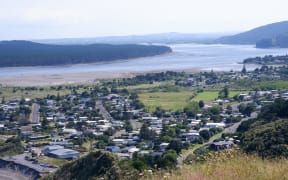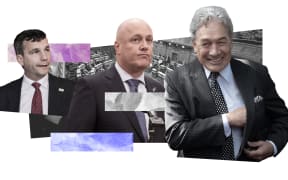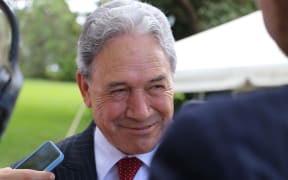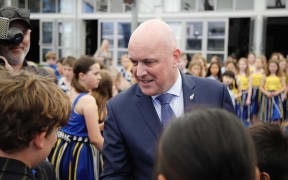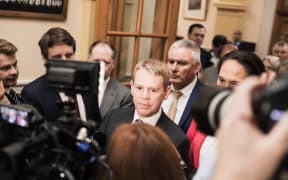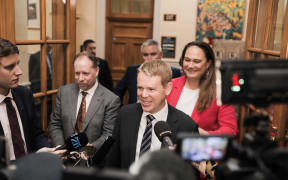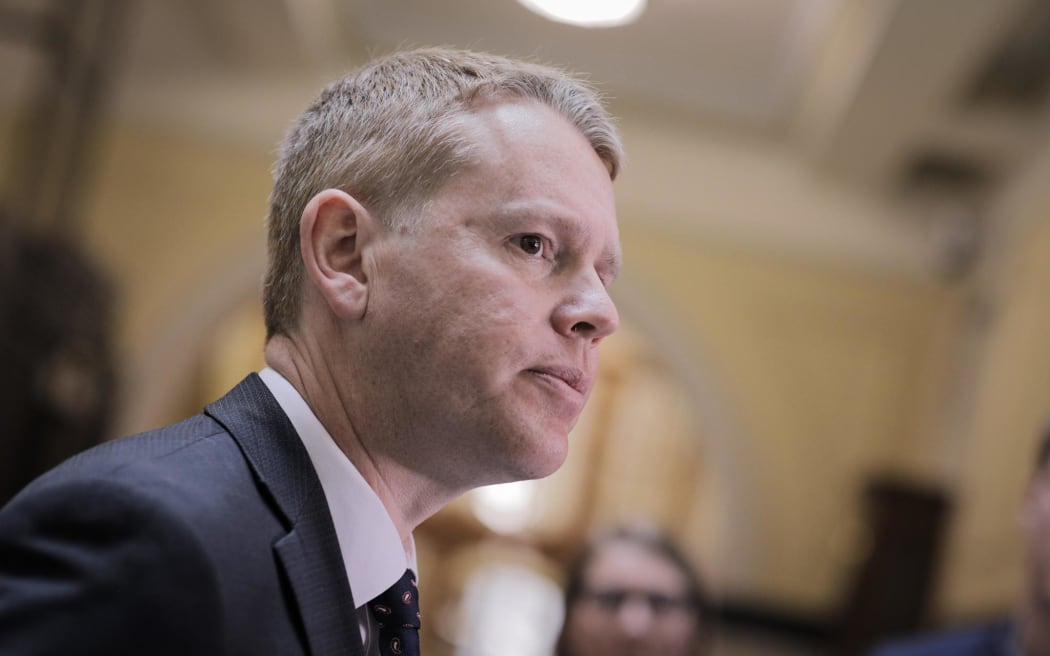
Labour leader Chris Hipkins says there were a number of reasons why his party lost support. Photo: RNZ / Angus Dreaver
Analysis - Labour holds 35 seats in Parliament and of those only 17 are electorate seats. How could it lose so badly and give up so many seats to National? Christopher Luxon gets ready for negotiations to form his new government and it seems that he's going to need NZ First - but what does Winston Peters really want?
The Electoral Commission's preliminary results tell the tale - in the 121-seat Parliament Labour holds 34 seats, 17 electorate and 17 list.
National holds 50 seats, 45 electorate and five list.
After the 2020 election Labour held 46 electorate seats and 19 list seats. It lost one of the electorate seats in the Hamilton West by-election.
One of the most worrying aspects for Labour was the way previously rock solid seats went to National, including those in what was known as the "red wall" of Auckland suburbs.
A particularly glaring example was Mt Roskill, the seat previously held by Phil Goff and then Michael Wood, who won it in 2020 with a 13,853 majority.
This time National's Carlos Cheung, hardly a household name, won it with a majority of 1429.
Mt Albert was another. The seat held by Helen Clark and then Jacinda Ardern, who in 2020 had a majority of 21,246 over National's Melissa Lee. The preliminary result had Labour's Helen White ahead of Lee by just 106 votes.
White surprised media by saying she was "really, really proud of my result".
And Foreign Minister Nanaia Mahuta losing to a 21-year-old Te Pāti Māori, candidate, Hana-Rawhiti Maipi-Clarke, was perhaps the biggest shock of all.
She is not coming back. "That's me, I'm done," was her reaction to losing the Māori roll seat of Hauraki-Waikato which she held for 27 years.
How could this happen? Labour leader Chris Hipkins told Morning Report his party's loss of support, particularly in Auckland, was due to a multitude of factors.
"We saw the ultimate end result of that on Saturday night," he said.
"We lost a lot of support in Auckland during the lockdown period and we haven't regained it."
But Hipkins said it was more complicated than that.
"It wasn't just about the lockdowns, I think we need to spend a bit of time understanding there were a whole lot of issues in there. It's also about things around crime in Auckland - there's a whole bundle of issues."
The Herald's Derek Cheng, in a detailed analysis, set the question "how did it all go so terribly wrong?" and explained why.
Labour was sailing along at above 50 percent in regular Taxpayers' Union Curia polls until November 2021, when it dropped to 44 percent and, for the first time, the wrong direction/ right direction metric went negative.
The Delta variant was creeping through Auckland and lockdowns were extended.
Ardern, acting on advice, was trying to protect minority groups who were most at risk.
"Helping to protect minority groups - though not as much as health advocates wanted - generally isn't the best way to maintain appeal among the majority," Cheng said.
"Ardern's grip on the centre was starting to loosen."
Then there was the vaccine mandates crisis and the disinformation that was spreading through the country. It led to the occupation of Parliament's grounds in February 2022.
"Starting from December 2021 - when the vaccine pass essentially created two classes of Kiwi - which Ardern justified on public health grounds - New Zealanders were fed and soaked up Russian-seeded fake news about Covid-19," Cheng said.
"According to a major Microsoft report, New Zealanders consumed Russian propaganda at a level 30 percent higher than Australia and the United States."
The cost of living was starting to rise as inflation increased in response to the massive cash injections by the Reserve Bank to keep the economy going during the pandemic, and it was around March 2022 that National pulled ahead of Labour for the first time in the 1News Kantar poll.
It was really downhill from there apart from a blip when Chris Hipkins became prime minister.
The spate of ram raids gained vast publicity and there was the confusion and criticism surrounding co-governance. Labour was under fierce attack from National every day Parliament sat.
All of this happened well before the campaign - what happened during those six weeks made little difference to Labour's situation.
The one event that dragged Labour further down was Hipkins' decision to scrap the wealth tax policy.
"The kicker for the red-green swing voters was Hipkins ditching the wealth tax," Cheng said.
"Labour was still polling in the low to mid-30s and virtually neck and neck with National before Hipkins decision was made public in early July. Afterwards, Labour began its inexorable downward slide into the 20s."
Hipkins was caught in the middle of a perfect storm. With his party already in serious trouble he had to deal with misbehaving ministers and lost Wood, Stuart Nash and Kiri Allan while Meka Whaitiri defected to Te Pāti Māori.**
The swing of the red-green vote was very evident in Wellington, a public service city which usually strongly favours Labour candidates.
The Greens' Tamatha Paul won Wellington Central and Julie Anne Genter won Rongotai, results which would previously have been unthinkable.
Stuff published a cartoon that said it all. A disconsolate Hipkins surveying the loss and saying: "Thank goodness I ruled out a wealth tax, eh?"
Herald columnist Simon Wilson wrote about the Mt Roskill result, saying the electorate had many retailers and other small businesses.
"Every ram raid and burglary to one is an assault on them all," he said.
"It (Labour) lost because it did not know how to respond meaningfully to people who feared for their lives."
Labour will ponder long and hard about what went wrong but attention shifts quickly after elections, and now it is all on Christopher Luxon and the negotiations that will take place as he forms his new government.
Special votes and final results will be announced on 3 November, and they're important this time because on the preliminary results National and ACT hold 61 seats between them, a majority of one.
National usually loses a seat on specials, but it will almost certainly pick one up from the November 25 Port Waikato by-election caused by the death of the ACT candidate.
Luxon isn't expected to do any significant negotiating until the final results are out, but he has started feeling his way through.
On Sunday he called in senior MPs for a strategy meeting at his Remuera home. They were Todd McClay, Simeon Brown, Paul Goldsmith, Chris Bishop and his deputy Nicola Willis.
The relatively easy part will be working out an arrangement with ACT, and that's likely to be talked about but not finalised before 3 November.
Luxon won't want to risk upsetting NZ First's Winston Peters by appearing to have settled a deal with ACT before he even knows whether he's going to need NZ First.
It's likely that this is one of the reasons why he's being so tight-lipped about it. He hasn't answered questions about what he's doing.
"I said we won't do it through the media, we'll do it directly with the parties involved out of respect to them," he said.
Luxon has also said he wasn't impressed with the way government formation negotiations have taken place in the past.
How he holds them when the rubber hits the road will be interesting.
Previously, negotiations between parties have taken place in Parliament. While the meetings themselves have been private, the participants have emerged after each session to run the media gauntlet and try to get away with giving as little away as possible.
As for Peters, he too has been mostly silent. Returning to Parliament this week he totally ignored journalists waiting for him at Wellington airport.
Arriving at his party's base near Parliament, he was in the same mood. "The only statement he gave to the various questions was 'get out of my way'," one report said.
"Just like old times," said Post editor Tracy Watkins, a former gallery reporter and political editor.
"Is Peters here for the coalition negotiations? What does Winston want? Déjà vu all over again."
What Peters wants goes to the heart of Luxon's upcoming negotiations.
Does he want NZ First to be a full coalition partner, with ministerial positions? Would he choose a confidence and supply agreement, keeping his distance from National and ACT?
One thing he does have more of than either Luxon or ACT's David Seymour is experience. As his campaign ads said, this isn't his first rodeo.
"It's not our first rodeo with Peters either," Watkins said.
"Which means we can probably predict the drill.
"We know that Peters won't give too much away till he knows how much more leverage the party has after special votes.
"But we can expect portfolios for himself and key MPs to be on his wishlist - certainly former minister Shane Jones, and likely Casey Costello, the former police officer and Hobson's Pledge spokeswoman."
Watkins said Peters was unlikely to countenance three-way coalition negotiations with Seymour, so National would have to conduct separate but parallel negotiations with both.
"And if National gets too far ahead of itself in negotiations with ACT, things could get sticky if it later finds it is absolutely reliant on NZ first and has to walk back some of its promises."
All of this points to Luxon continuing to keep his cards very close to his chest, and he's likely to continue the way he has started.
Luke Malpass, Stuff's political editor, said one thing Peters certainly wanted was durability for his party once he retired, whenever that was.
"In his speech on election night he specifically referenced taking NZ First to 2026 and beyond," Malpass said.
"This was no accident."
This led Malpass to to say that if the driving factor was durability, then the choices Peters made in the past might not be the same as those he makes in the future.
"Three times Peters has ended up a powerful minister, three times he has either been heavily defeated or turfed out of Parliament entirely," Malpass said.
"So this time, if he went in a different direction, it might be that NZ First looks at sitting on the cross benches.
"That being the case, it would need to be consulted on every bill, putting itself in an extraordinarily powerful position, with the opportunity of political exposure whenever it wanted."
That's a scenario Luxon probably won't want. It may be better to have Peters inside the tent rather than causing trouble on the outside.
The latter part of this week was taken up with the usual pictures of the new teams and the rookie MPs being inducted into Parliament and told how it works.
It's the easy post-election part for the party leaders. Luxon was happy and relaxed, as could be expected. He'll soon be sworn in as prime minister.
He has a short time of euphoria left, and the last word this week goes to Richard Prebble, writing in the Herald: "The moment National takes office, it owns the problems: the cost of living crisis, the housing shortage, pupils not at school, the time it takes to see a GP, ram raids, our failing infrastructure, and the climate crisis. Borrow, spend and hope remains unsustainable.
"The economy becomes National's responsibility."
*Peter Wilson is a life member of Parliament's press gallery, 22 years as NZPA's political editor and seven as parliamentary bureau chief for NZ Newswire.
** This story was published on 20 October, 2023, and updated on 24 October to correct reference to the political party.

